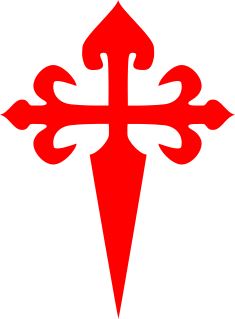 W
WThe following is an incomplete list of former Grand Masters of the Order of Calatrava, the current grand master of the order is King Felipe VI of SpainDon García (1164–1169) Fernando Icaza (1169–1170) Martín Pérez de Siones (1170–1182) Nuño Pérez de Quiñones (1182–1199) Martín Martínez (1199–1207) Ruy Díaz de Yanguas (1207–1212) Rodrigo Garcés (1212–1216) Martín Fernández de Quintana (1216–1218) Gonzalo Yáñez de Novoa (1218–1238) Martín Ruiz de Cevallos (1238–1240) Gómez Manrique (1240–1243) Fernando Ordóñez (1243–1254) Pedro Yáñez (1254–1267) Juan González (1267–1284) Ruy Pérez Ponce de León (1284–1295) Diego López de Santsoles (1295–1296) Garci López de Padilla (1296–1322) Juan Núñez de Prado (1322–1355) Diego García de Padilla (1355–1365) Martín López de Córdoba (1365–1371) Pedro Muñiz de Godoy y Sandoval (1371–1384) Pedro Álvarez de Pereira (1384–1385) Gonzalo Núñez de Guzmán (1385–1404) Enrique de Villena (1404–1407) Luis González de Guzmán (1407–1443) Fernando de Padilla Alfonso de Aragón y de Escobar Pedro Girón Acuña Pacheco (1445–1466) Rodrigo Téllez Girón (1466–1482) García López de Padilla (1482–1487) Catholic Monarchs King Juan Carlos I of Spain King Felipe VI of Spain (Incumbent)
 W
WAlfonso XII, also known as El Pacificador or the Peacemaker, was King of Spain, reigning from 1874 to 1885. After a revolution that deposed his mother Isabella II from the throne in 1868, Alfonso studied in Austria and France. His mother abdicated in his favour in 1870, and he returned to Spain as king in 1874 following a military coup against the First Republic. Alfonso died aged 27 in 1885, and was succeeded by his unborn son, who became Alfonso XIII on his birth the following year. To date, he is the last monarch of Spain to have died whilst on the throne.
 W
WAlfonso XIII, also known as El Africano or the African, was King of Spain from 1886 until the proclamation of the Second Republic in 1931. He was a monarch from birth as his father, Alfonso XII, had died the previous year. Alfonso's mother, Maria Christina of Austria, served as regent until he assumed full powers on his sixteenth birthday in 1902.
 W
WAlfonso de Aragon y Escobar (1417–1495), Duke of Villahermosa, Count of Ribagorza and Cortes and Grand Master of the Order of Calatrava, was an illegitimate son of John II of Aragon and one of his mistresses, Leonor de Escobar, daughter of Alfonso Rodríguez de Escobar.
 W
WDon García was the first Grand Master of the Order of Calatrava from 1164 to 1169 and was responsible for the foundation of many of the order's rules and battle traditions.
 W
WFerdinand VII was the King of Spain during the early- to mid-19th century. He reigned over the Spanish Kingdom in 1808 and again from 1813 to his death in 1833. He was known to his supporters as el Deseado and to his detractors as el Rey Felón.
 W
WGarci López de Padilla was a Spanish noble of the House of Padilla. He was the fifteenth Grand Master of the Order of Calatrava from 1296 - 1322. He is best known for his command of the Castilian forces at the Siege of Gibraltar and his participation in the greater campaign against the Kingdom of Granada undertaken by Ferdinand IV of Castile in 1309.
 W
WPedro Muñiz de Godoy y Sandoval was a Castilian Spanish noble, in the service of Henry II of Castile, and John I of Castile. He was the Grand Master of several military orders including the Order of Alcántara, the Order of Calatrava, the Order of Santiago and adelantado of Andalucía. He was killed at the Battle of Valverde in 1385.
 W
WIsabella II was Queen of Spain from 1833 until 1868.
 W
WRuy Pérez Ponce de León or Rodrigo Pérez Ponce de León was a Spanish noble of the House of Ponce de León, in the service of the Kingdom of Castile. He was the 15th Grand Master of the Order of Calatrava from 1284 to 1295 under King Sancho IV of Castile and further served as Mayordomo Mayor del Rey from 1293 - 1295, also under Sancho IV.
Enrique de Villena (1384–1434), also known as Henry de Villeine and Enrique de Aragón, was a Spanish nobleman, writer, theologian and poet. He was also the last legitimate member of the House of Barcelona, the former royal house of Aragon. When political power was denied to him, he turned to writing. He was persecuted by Alfonso V of Aragon and John II of Castile owing to his reputation as a necromancer.